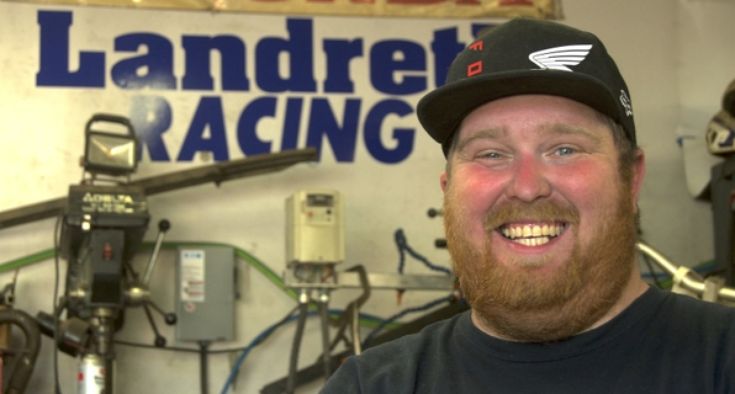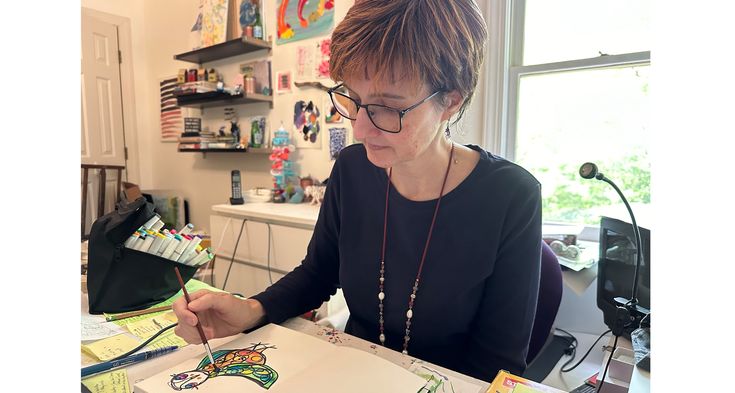As a kid, Robert Landreth figured everyone knew how to race.
His dad began competing on motorcycles in the 1970s. Robert received his first four-wheeler for his second birthday. Before starting kindergarten, he learned how to race with his dad as coach. He loved hanging out after school at his grandpa’s motorcycle repair shop.
Today, he’s a vigorous man with a reddish beard and playful manner. He developed a career working with motorcycles as parts manager at a local store and later as assistant manager at Honda of Winston-Salem.
He and his wife, Randi, live less than 6 miles from his family in Walkertown, North Carolina, a small town in Forysth County. “We can yell at each other, we’re close enough,” he joked.
When the two married, Robert’s family gained more people to love: sons Noah, now 14, and Keagan, 7. They were joined by the family pets, Dasa the chihuahua, Elka the pug, and Piston the cat, all named after brands or parts for four-wheelers.
No one looking at Robert would mark him as a target for a life-threatening glioblastoma, one of the most common and deadly types of brain tumors. More than 12,000 new cases are reported annually in the U.S. The median age for diagnosis is 64. Robert was only 32 when he was diagnosed. Without treatment, patients can die in four months or less from the fast-growing, aggressive tumors.
Supportive care throughout your cancer journey.
Blurry vision and terrible headaches
In 2019, Robert experienced occasional bouts of blurry vision. Every couple of months, he’d have a headache so severe he’d have to crawl into bed and just lie there for a day. Randi, then his fiancée, pressed him to see a doctor. But Robert said he was stubborn and wouldn’t get checked.
The headaches increased to nearly every week. In November 2020, he stopped by his parents’ house and asked his mom when she had painted purple polka dots on the walls. She hadn’t.
At Kernersville Medical Center’s emergency department, the medical team tested him for COVID-19, which came up negative. On an MRI they found a brain tumor a little bigger than an egg. Robert was transferred to Novant Health Forsyth Medical Center in Winston-Salem.
Robert's doctors were honest about what the imaging revealed. They wouldn’t know if the tumor was cancerous until a biopsy was performed. But the surgery needed to happen right away before the tumor grew too big to be operable. Robert realized what had happened in his mother’s home. “The tumor put so much pressure on my brain, it made me see colors,” he said.
In the hospital, Robert was still getting work calls and ordering bike parts prior to the procedure. He tried not to think ahead. Randi stayed with him, happy to be allowed there during the tumult of the pandemic. The surgery went well, and Robert returned home, grateful for Thanksgiving.
He learned he had cancer the day after the holiday. After hearing the news, Robert quietly slipped into the family bike repair shop, now owned by his dad. His dad and brother were there, chatting. He took in the familiar scents of fuel and oil. He listened to the radio, smiled to himself, and thought how special it is to be alive.
He didn’t tell anyone in the family about his diagnosis for a whole week. “Of course, they all freaked out,” he said.
Outrunning a tumor: Chemo and radiation
Treatment began immediately with chemotherapy and radiation. Robert was happy to discover he could receive the chemotherapy in pill form. The radiation procedure required him to place a mask over his head, but this felt surprisingly comfortable. He’d spent countless hours in formfitting helmets for racing, so another version of a helmet didn’t bother him.
The radiation ended in 2021. He continued chemotherapy, resumed racing, and even got Randi into the sport as a racer. He capped the year by marrying his girl.
A follow-up MRI in the spring of 2022 showed the tumor had returned. By July it had expanded. Robert would need a second brain operation. He tried negotiating the timing around race season. “I’m winning my local series. I’m in the top 10 of the nationals. Our last race is Halloween weekend. Maybe let’s do it around Thanksgiving again,” he proposed.
His surgeon replied, “How about next Thursday?”
The surgery was successful, but during recovery, Robert developed swelling on one side of his head from buildup of spinal fluid. Each person produces two cups of spinal fluid a day, a continuous refreshment as the body nourishes the brain with that fluid.
In a third operation, a surgeon placed a hollow tube called a shunt in Robert’s brain to pump and redirect the fluid. Robert went on to win a local race series, the 421 TT for four-wheelers.
Rounding the turn
In December 2023 the tumor returned again. It started small. Chemotherapy couldn’t prevent it from growing and a surgeon had to cut it out again in April. Robert was back home the following evening and celebrated with his family at a local restaurant.
“That was the best Japanese food I’ve ever had,” he marveled. “I’ve eaten there a hundred times, but it was better than it had ever been.”
A few days later, he was at the track helping his sons race.
Following his four surgeries, Robert is monitored with MRIs every three months. He started experiencing seizures about 18 months into his medical journey and takes medication to prevent them. He also tires more easily and stopped racing, though he still rides. “I’ve gotta have the wind in my face every once in a while,” he said.
He appreciates each day with his family. He enjoys hanging out at the family bike shop. And he salutes Randi, who has been there for every doctor’s appointment while homeschooling their children.
To others going through a similar experience, his advice is simple. “Be positive,” he said with his usual smile. “You’re still here.”








